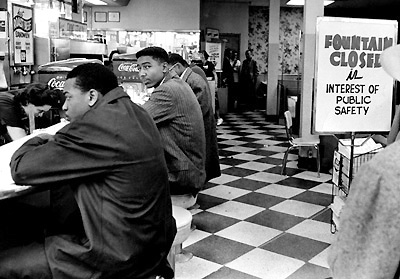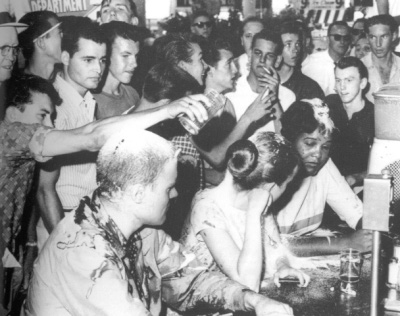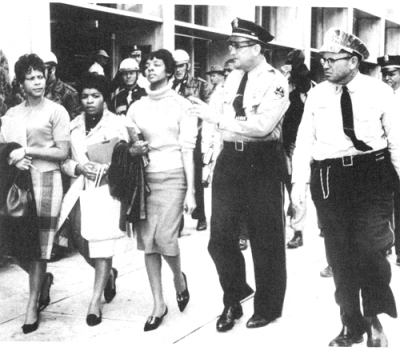Friday Lazy Linking
Winter Soldier: Just Another Tuesday. From Ryan Endicott, formerly a United States government Marine stationed in Iraq.
Via Clay Claibourne, L.A. I.M.C. (2009-05-13): Winter Soldier Southwest on YouTube #1
The regulatory State versus freed markets and the human future: A quote from Anne Robert Jacques Turgot, via B.K. Marcus at Mises Economics Blog:
To expect the government to prevent such fraud from ever occurring would be like wanting it to provide cushions for all the children who might fall. To assume it to be possible to prevent successfully, by regulation, all possible malpractices of this kind, is to sacrifice to a chimerical perfection the whole progress of industry; it is to restrict the imagination of artificers to the narrow limits of the familiar; it is to forbid them all new experiments; it is to renounce even the hope of competing with the foreigners in the making of the new products which they invent daily, since, as they do not conform to our regulations, our workmen cannot imitate these articles without first having obtained permission from the government, that is to say, often after the foreign factories, having profited by the first eagerness of the consumer for this novelty, have already replaced it with something else. … Thus, with obvious injustice, commerce, and consequently the nation, are charged with a heavy burden to save a few idle people the trouble of instructing themselves or of making enquiries to avoid being cheated. To suppose all consumers to be dupes, and all merchants and manufacturers to be cheats, has the effect of authorizing them to be so, and of degrading all the working members of the community.
–Turgot, Éloge de Gournay (1759), translated by P.D. Groenewegen
Outrage
All Bizarro News that am unfit to print. In which a argument against an imaginary, Bizarro World version individualism is set to fight with a completely imaginary Bizarro GOP which somehow became
the party of untrammeled freedom and maximum individual choice
(?!). For more on an earlier installment in David Brooks’s concerted efforts to liberate the Republican Party from moral principles that it never held, cf. GT 2009-01-28: How to be social while staying civilizedOn intersections, boundaries, and fortifications. bfp, flip flopping joy (2009-05-01): northern territory, sexual activity, teens and police state. In which Ozzie territorial governments set out to create a territorial sex-Stasi to coerce reports of any and all sexual contact by Aboriginal teenagers. Including consensual sex or fooling-around between one teenager and another. Quote:
This sort of nation/state targeted monitoring of the sexuality of teens/young people is something most people of color are vividly aware of. When you through in queerness, disability, and nationality (among others), and community expectations, things for especially teen girls of color get even worse. How do we learn, engage in, and trust ourselves to build a healthy fabulous sexuality when from the time we reach reproductive age, the nation/state literally owns the first and final say as to what happens to our bodies? How do we learn to say
no
oryes
when the nation/state insists on doing it for us?We need democratic governments instead of private protection agencies to ensure that political decision-making remain transparent and decision-makers are held accountable to the people: Molly Ball, Las Vegas Review-Journal (2009-05-10): SECRET GOVERNMENT: Lawmakers keep public out as session winds down with most important decisions looming
On planes as prisons and terrorizing as
security
: Jessica Bautista & Kitty Caparella, Philadelphia Daily News (2009-05-12): Blind interpreter detained at Philly airport says he has nightmares from arrest (On which, cf. also GT 2008-05-07: Airport security.)On legal lynching, part 2. For part 1, see last week, where I said this:
When Anarchists propose that all the functions currently controlled by the authoritarian State, including the judgment of cases involving disputes or violent crimes, we are inevitably told that without a State-controlled, hierarchical system of courts, you’d have nothing more than the justice of the lynch mob. This is actually a classic example of statist inversion: by focusing on the dangers that informal and irregular efforts at seeking justice will lead to a disregard for objectivity or evidence, the statist completely blanks out the ways in which formalization and enforced hierarchy oblige government courts to disregard evidence themselves in the name of formal procedures, and to elevate authority above objectivity, by standing on ceremony or respect for turf at the expense of substantive justice. If the state’s plans to murder Troy Anthony Davis are not an example of a slow-motion lynching, what is?
To which we will add, this week: Radley Balko, The Agitator (2009-05-18): Prosecutors Blocking Access to DNA Testing In which government prosecutors make active efforts to block access to DNA tests that could potentially exonerate the innocent, all in the name ofyou-had-your-chance
jurisdictional turf wars and statist legalfinality.
The police are here to keep us safe. By driving their cruisers at 109 MPH in a 45 zone, on a major commercial thoroughfare, late at night, with no sirens and no flashing lights. Then, when this predictably leads to a fatal crash that kills one of the cops, by lying about it to the media in order to make your dead buddy look like more of a hero, and by arresting the poor innocent man that the cop slammed into at 90 MPH for his allegedly reckless driving.
The police are here to keep us safe, part 2. Radley Balko, Hit & Run (2009-05-18): Cops Gone Wild, in which cops from around the country celebrate National Police Week in D.C. with wine, weapons, and reckless driving.
The police are here to keep us safe, part 3. Commentary from Center for a Stateless Society news analyst Tom Knapp (2009-05-18): To Serve and Protect (Themselves)
Name your own salary. Las Vegas Sun (2009-05-16): City, county may lose say in police pay negotiations. Las Vegas Metro is currently working to get a new state law passed which would allow Vegas cops to get a salary set unilaterally by their own boss cop, and then send the bill, whatever it may be, to folks who had absolutely no say whatsoever in the negotiations.
The Gangsters in Blue come to Philly. Radley Balko, The Agitator (2009-05-01): Update on Bodega Raids by Rogue Philly Narcotics Unit Balko asks, apparently non-rhetorically,
Why did no one in the department ask why an
Come on, really? The reason is that the State as such is essentially irresponsible, and this kind of thing is Standard Operating Procedure forelite
narcotics unit was wasting its time busting immigrant shop owners with no criminal record for selling bags instead of pursuing actual drug distributors?elite
narc squads. There’s a lot here to justify outrage, but very little to justify surprise.On terror-famines for the international narco-crats. Jacob Sullum, Hit & Run (2009-04-30): U.S. Intensifies Campaign to Wipe Out Afghan Economy. Cf. GT 2004-11-20: The tall poppies and GT 2007-01-13: The tall poppies, part 2.
Think.
Austro-Athenian Virtue Ethics versus Moral Fictionalism. Neverfox, Instead of a Blog (2009-05-17): Pulp Non-Fiction
How political control of schools produces terrible textbooks. Tamim Ansary, Edutopia (November 2004): A Textbook Example of What’s Wrong with Education. (Via B.K. Marcus, lowercase liberty (2009-05-18): What’s wrong with textbooks?)
Left-Libertarianism
On dialectical jujitsu: Roderick Long, Austro-Athenian Empire (2009-05-19): How to annoy a conservative
Ownership failures, not market failures Chris Dillow, Stumbling and Mumbling (2009-05-01): Markets, the poor & the left. Dillow makes two really important distinctions: one of them the familiar left-libertarian distinction between freed markets, on the one hand, and actually-existing corporate capitalism, on the other; the other a less familiar, but very important, distinction between market processes and patterns of ownership. Quote:
In many ways, what look like ways in which markets fail the poor are in fact merely ways in which a lack of assets fail the poor.
Exactly; and the many cases where there are not reallymarket failures,
but ratherownership failures,
have everything to do with feudal, mercantile, neoliberal, and other politically-driven seizures and reallocations of poor people’s land, livelihoods, and possessions — and nothing to do with genuine market exchange.
Counter-Economics
Against
tax-and-regulate
reformism, and in praise of a thriving black market economy: Crispin Sartwell, eye of the storm 2009-05-18Law among the pirates. Jesse Walker, Hit & Run (2009-05-19): To Live Outside the Law You Must Be Honest
Urban farming. Milagro Allegro Community Garden, L.A. I.M.C. (2009-05-12): Highland Park Adds a Garden
Package-dealing portable double-key encryption for web browsing and web mail: Chris Acheson (2009-05-05): Firefox Portable + GnuPG + FireGPG = CryptoFox. (Via @H+ [2009-05-20], via Human Iterations 2009-05-21.)
Movement
On freeing the MHD3 and all political prisoners. By way of follow-up to the recent report on the bullshit arrest and jailing of the Motorhome Diaries crew, see Motorhome Diaries (2009-05-15): Jones County Sheriff's Department Falsely Arrests MHD Crew, which recounts the full timeline of their arrest, jailing, and release. See also Motorhome Diaries (2009-05-17): Thanks for springing the MHD3 from Jones County (with Allison Gibbs), Motorhome Diaries (2009-05-20): The "Grumbling Old Fart" Addresses Jones County Sheriff Alex Hodge's Statements, Motorhome Diaries (2009-05-20): MHD on Freedom Watch
Don’t vote. Secede and repudiate. Stewart Browne, Strike the Root (2009-05-18): A New Strategy For Liberty – Part 2: Secession in Three Easy Steps
You say
pissed-off, man-hating, dykes with an excess of body hair
like it’s supposed to be a bad thing… Kevin Carson @ Mutualist Blog (2009-05-21): An Open Letter to Keith Preston, Mike Gogulski @ nostate.com (2009-05-21): Taking sides on the right to be a complete jackass, Darian Worden (2009-05-21): Perverts Versus Preston, and Brad Spangler (2009-05-22): Bigotry and Revolution
Communications
Boston Anarchist Reading Group. Jake, Anarkismo.net (2009-05-17): Anarchist Reading Group at the Boston Anarchist Picnic! June 6th, 2009
Iconoclasta for Colombian anarquistas: Revista Iconoclasta – Anarcol, Anarkismo.net (2009-05-15): New anarchist periodical in Bogota – Iconoclasta. More information online at http://prensaiconoclasta.entodaspartes.net/.
New subscriptions. Anarchy in the Garden





